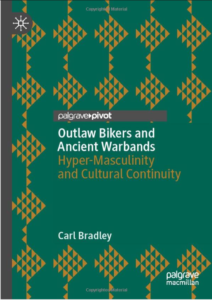Reviewer: Dr Damien Rogers1
Review published in National Security Journal, 30 May 202
Download full PDF version – Book Review – Outlaw Bikers and Ancient Warbands: Hyper-Masculinity and Cultural Continuity (190 KB)
Carl Bradley, Outlaw Bikers and Ancient Warbands: Hyper-Masculinity and Cultural Continuity, Springer Nature (Cham, Switzerland, 2021). ISBN 9783030753467. 134 pages

Carl Bradley’s much anticipated first book is a timely and welcome contribution to our shared understanding of outlaw biker groups. By focusing on how these groups use violence to forge a strong sense of collective identity among their members while maintaining intragroup order and to pursue some of their more pernicious ends while engaging in intergroup rivalries, Bradley demonstrates why outlaw biker groups are an increasingly important phenomenon in the conduct of contemporary world affairs and, as such, worthy of sustained scholarly attention. Just as the number of these groups increases throughout Europe and North America, as well as in Australia and New Zealand land, the membership of outlaw biker groups – including those who choose to associate with them – continue to grow. Bradley underscores the extent to which these groups are a force to be reckoned with at the local, national and global levels, illustrating how the reach of their power broadens and deepens through the many international connections fostered among these bikers. This sometimes results in the ‘patching over’ of a smaller group into a larger one and, at other times, increases the scale, or intensifies the frequency, of a group’s transnational activities.
Bradley describes how these groups emerged and then spread during the second half of the twentieth century. He explains the gradual process by which biker groups link across disparate and distinct geographies:
Aotearoa New Zealand and Australia are important locations to highlight here as both countries, made up of previous British colonies, saw small groups of men form outlaw biker clubs, embracing the culture and setting the scene that would be repeated by the Hells Angels and Bandidos in Canada, Scandinavia, and other parts of Europe. For the Hells Angels, Auckland city in Aotearoa New Zealand was their first chapter outside California; for the Bandidos, Sydney Australia was their first outside of the United States. From these beginnings, there were moves into Europe and, now, the internationalization of the outlaw biker culture is spreading across parts of South East Asia and into South America” (p. 14).
He draws particular attention to those combat veterans who, returning home from conflict theatres and leaving military service, found outlaw biker groups offered them familiar opportunities to bond with other men, enact hyper-masculine ideas and actively contribute to the cohesion of small groups. Even though these bikers tend to be highly sociable, evidenced through their frequent use of club houses and bars, these groups are alienated from their wider societies. They are routinely involved in the so-called shadow economy, thereby marking themselves as separate from the rest of society. For Bradley, members of these groups are, therefore, best understood as liminal social figures. Estranged from the wider communities to which they belong, they make easy targets for those who need a scapegoat for certain behaviors privately indulged in, but also public censored by, mainstream society. Moreover, these groups become readily identifiable targets for law makers and security professionals.
Yet Bradley takes a broader, longer-term view, signaling the importance of the material conditions that give rise to this phenomenon by referring to neoliberalism, the inequalities that neoliberal policies and practices produce, and the recent impacts of COVID-19, which he treats as an intensifier of these inequalities. Bradley argues that “the effects of economic and class marginalisation under successive western democratic governments and policy decisions suggest that the shadow economy provides a means to earn money in a system dominated by capitalist ideas, albeit in the trade of illicit goods” (p. 51). For those policymakers who see
______________________
1 Dr Damien Rogers is a Senior Lecturer in Politics and International Relations at Massey University, Albany Campus, Auckland. He is a friend and colleague of Dr Carl Bradley.
